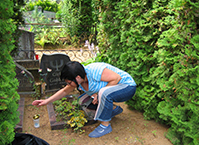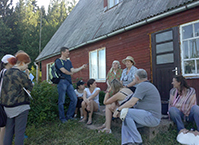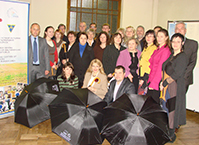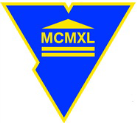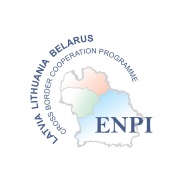E-MUSEUM “VITAMEMORIAE”: COLLECTION AND RESEARCH
Foto
To record people’s life stories, traditions, customs, rituals, rare photographs, old documents, ethnographic differences in funeral rites, etc. the researchers of Daugavpils University and Yanka Kupala Grodno State University carried out field studies in LV and BY territories: in the villages of Krāslava, Rēzekne, Daugavpils regions (Asūne, Foļvarka, Kruki, Skrudaliena, Indra, etc.) and in Belarus (Braslav and Vitebsk districts). The field studies were implemented in the framework of the project “Popularization of the Centres of Oral History in the LV – BY Cross-Border Area”, ID Nr. LLB–2–143, of the Cross Border Cooperation Programme Latvia–Lithuania–Belarus implemented within the framework of the European Neighbourhood and Partnership Instrument 2007–2013.
During the research and the expeditions, the project implementers collected, segmented, transcribed, and digitized the audio-visual materials (audio and video records, photo evidence). To make the collection of the E-Museum more complete, the field researchers and cemetery researchers of Daugavpils University and Grodno University will segment and systematize the audio-visual materials collected during oral history, cemetery research, folklore and dialectology expeditions of the previous years that until now have not been used, aiming at including the best and most valuable segments of the collection into the E-Museum.
The story tellers whose life stories make the input of the E-Museum are people of various generations, mostly elderly people. The childhood of aged people, who at present are about 80 years old, proceeded in the 1930s, therefore the segmented audio-visual units included in the E-Museum chronologically begin from 1929 and can describe only the respondents’ childhood memories. The memory of the older generation is particularly important for the anthropological and historical research – it shifts the time borders, allows for moving to the events of the past through the viewpoints of those who have experienced those times. The facts can be found in chronicles, but what the witnesses of that time can reveal give the memories colour, scent, involve one into mutual emotional experience. The witnesses of the epoch tell about the events form the viewpoint of their own experience.
To motivate the respondents to share their life stories, the project field researchers used Paul Thomson’s oral history research method – enlarged vision of social history where diverse groups of the society are brought together and share common historical experience.
The research basis is the methodology of a semi-structured interview that envisages focused (guided) reconstruction of the past events and an interviewer only helps the respondents to reconstruct the past.
The oral history collection of the E-Museum is envisaged to be used not only by specialists but also by a greatest possible range of non-specialists, therefore, departing from the academic tradition envisaging a complete script and transcript (written transcription of an audio or video record) of life stories, the project experts agreed to segment 360 most vivid, colourful, expressive, unusual, typological or extraordinary audio-visual units (photo, video and audio testimonies) – thematically complete excerpts, and to systematize them according to the thematic plan that would encompass both the historical processes of the 20th century (from the 1920s-30s) and the most essential events of an individual’s life.
ACCESSIBILITY OF THE COLLECTION
The interviews included into the collection are arranged according to the principle of historicism, anthropologism and personalia, indicating the author’s name and the interviewer’s name and surname.
-
Dziesma "Irbenājs"
Irbenājs
Mums kalnā irbenes, Ak, mums kalnā irbenes, Nu un ko, nu irbenes, Nu kam kāda daļa: irbenes. Tur meitene pastaigājās, Ak, tur meitene pastaigājās, Nu un kam kāda daļa, pastaigājās. …
Researcher: Dr. philol. Jeļena Koroļova, Daugavpils Universitāte
Categories: Jefrosinja Ivanova, Svētki un tradīcijas
-
Lubou Veramei: About food storage
I also would like to ask you where did you keep food, meat, for example? You see, now we have fridges, and what about that times?
Meat? We sticked a pig, salted the meat and put into the barrel. …
Researcher: Олег Коляго, старший преподаватель, ГрГУ им. Я. Купалы
Categories: Family, Lubou Veramej
-
Lubou Veramei: About school
Please tell me when did you go to school?
When I went to school... Well, that was before the war. So, it happened in the Polish times. But I … I attended school just a little. A little. And …
Researcher: Олег Коляго, старший преподаватель, ГрГУ им. Я. Купалы
Categories: School, Lubou Veramej
-
Lubou Veramei: About the daily diet
Please tell me, what kind of dishes were on the table? What do you remember?
There were… For the first course there was a soup, cabbage soup, beetroot soup, in summer there was nettle soup. …
Researcher: Олег Коляго, старший преподаватель, ГрГУ им. Я. Купалы
Categories: Family, Lubou Veramej
-
Lubou Veramei: About the economy
Please tell me what did the village look like? What did the houses and roads look like?
The roads were made of cobblestone. The roads were bad. The houses were thatch-roofed. Thatch. Thatch sheaves. …
Researcher: Олег Коляго, старший преподаватель, ГрГУ им. Я. Купалы
Categories: Family, Lubou Veramej
-
Lubou Veramej: Baking bread
Please, tell me how did your mother bake bread?
She baked bread. She baked good bread. She could bake very perfectly, she could bake bread. Very good. And I baked bread too, I remember. I remember …
Researcher: Олег Коляго, старший преподаватель, ГрГУ им. Я. Купалы
Categories: Family, Lubou Veramej
-
Lubou Veramei: About life before the war
Please tell me, Lubou Uladzimirauna, what bright memories do you have about pre-war period when there was the Polish governance here?
In the Polish times we tilled the land, we worked the land. We …
Researcher: Олег Коляго, старший преподаватель, ГрГУ им. Я. Купалы
Categories: Family, Lubou Veramej
-
Lubou Veramei: About father
And did your father tell you how he lived before the Revolution?
Yes, he told me that they were left alone when they were small. Their parents died. The elder brother brought them up. They were ff& …
Researcher: Олег Коляго, старший преподаватель, ГрГУ им. Я. Купалы
Categories: Parents, Lubou Veramej
-
Lubou Veramei: About leisure
You say that the youth lived joyfully at that time.
Oh, joyfully, oh, very joyfully. I grew up already, I was a young lady already. I did already. Also I had elder sisters. Now twelve and thirteen …
Researcher: Олег Коляго, старший преподаватель, ГрГУ им. Я. Купалы
Categories: Confessional and international relations, Lubou Veramej
-
Fedor Karpeka about the landlord
I wanted to ask you about the local landowner, about his estate. What do you remember about it?
Well, what I still remember... Why my stepmother… My father… when my mother died, my …
Researcher: Олег Коляго, старший преподаватель, ГрГУ им. Я. Купалы
Categories: Confessional and international relations, Fedor Karpeka


